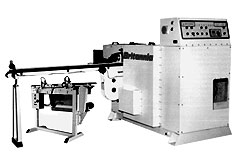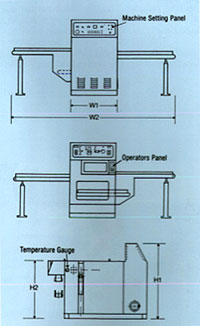|
|
|
 |
The
Britannia Universal Rotary Soap Stamping Press is a
design combining modern technology with traditional
practice. The mechanism is designed and constructed like
a high precision Swiss watch with all the moving parts
held between two massive steel plates. All the immense
forces channelled into deforming the soap by pressure,
are controlled and directed with the highest degree of
precision and reliability. |
|
TYPE:
QRX ROTARY 590 |
|
|
|
FUNCTION: To stamp the pre-cut soap billets
into the finished tablet shapes |
|
|
|
FEATURES: |
- Double stamping
action
- Multi-cavity soap
dies to fit 590 mm mandrel
- Stamping cycle time
in the range of 15 to 75 strokes per minute
- External handwheel
adjustments for rapid die (product) change
- Operator given
maximum access to dies
- Machine designed to
minimise scrap recycle percentage
- Brake stops the
stamper with dies in open position to ease cleaning
- 5.5 kW main drive
motor
- Electronic
air/vacuum programmer is standard on control panel
|
|
OPTIONS: |
- Temperature control
of die chilling to mandrel and ram
- Internally fitted
vacuum pump
|
|
GENERAL DESCRIPTION
A horizontal type stamping machine with a rotating
mandrel on which are mounted two die blocks, and an
oscillating ram on which on die block is mounted. The
machine includes the die holders, single infeed and
outfeed conveyors, and cam designed stamping movement.
The machine included the facility for both air powered,
and mechanical soap ejection. The mechanisms are all
enclosed in a fabricated steel frame, complete with
safety guards and an active lubrication system.
|
|
 |
The
soap billet is fed into the machine by mans of an infeed
conveyor, it is then lifted into place by a soap lifting
mechanism. It is stamped to shape by a double action
stamping movement of the ram, then the soap is rotated
in the mandrel to the unloading postion. The soap tablet
is pulled through a de-flashing stripper plate by a
rubber vacuum operated sucker, and placed on an offtake
conveyor ready for feeding into a wrapping machine.
Excess flash drops by gravity, and is usually recycled
via scrap return conveyors to the hopper of a duplex
vacuum plodder. The soap dies incorporate large chilling
galleries for the circulation of a low temperature
refrigerant which prevents soap sticking in the
cavities. |